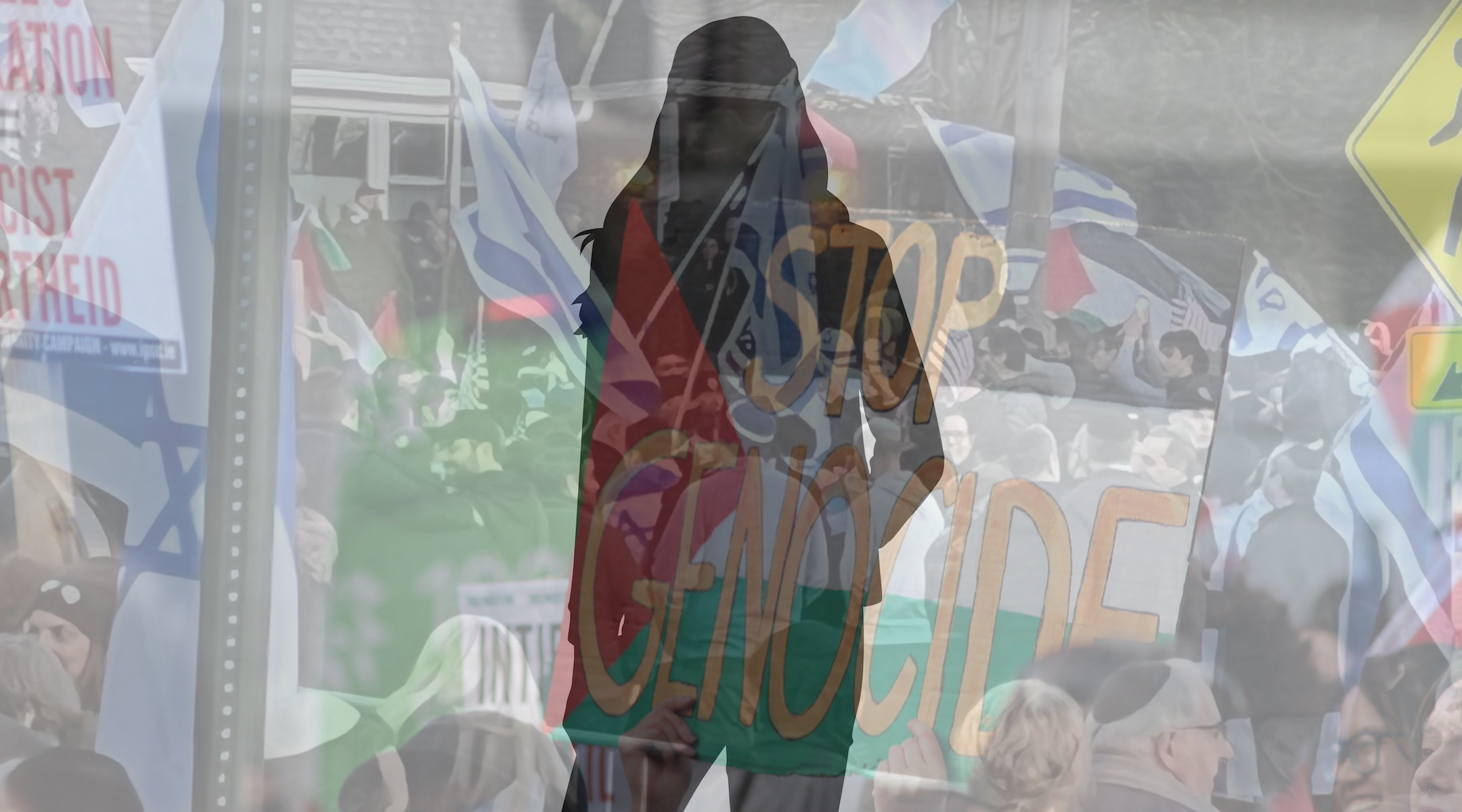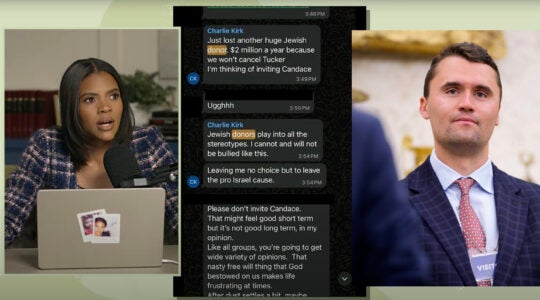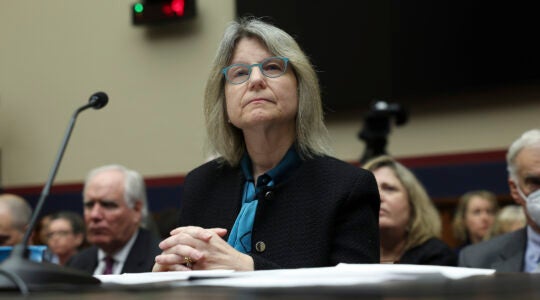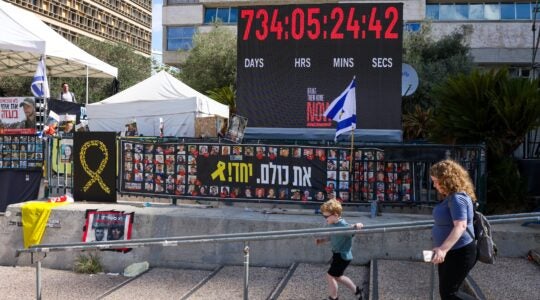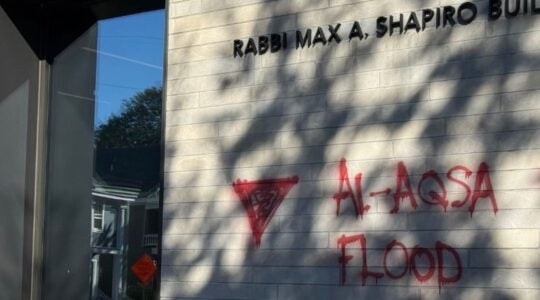This article was produced as part of JTA’s Teen Journalism Fellowship, a program that works with Jewish teens around the world to report on issues that affect their lives.
(JTA) — When Charlotte McAninch’s Chicago high school permitted a school-wide pro-Palestine protest in January, McAninch stayed home. The 16-year-old Jewish sophomore felt uneasy about the protest. She said her school provided no education on the war or context on the decades-long conflict in the Middle East. As a result the protest made McAninch too uncomfortable to attend.
“I had a few friends who viewed the protest as antisemitic, which I did not, but I definitely felt a little iffy about it,” said McAninch. “I did not go to school that day, because I was really stressed out. And I didn’t need that in my life that day.”
She is still waiting for the school to provide appropriate resources for students who are grappling with what the war in Israel means to them.
“I still think about it a lot,” she said. “And it has kind of affected my opinion of the school’s administration.”
McAninch had to rely on adults outside of school to help her cope with the war, mainly her parents. Other teens got support from their synagogues. But not all teens have those resources available. Many of the teens who have looked to their teachers and administrators say they have received confusing mixed signals or no historical understanding of the war, leading to disappointment in their schools.
What’s holding a lot of schools back is fear, said Hagar Ben-Eliezer, a wellness therapist for Berkeley Hillel. She also has a private practice focusing on teens and families managing grief and trauma.
“I think a lot of schools are scared like, ‘oh, we can’t put them all in the same room,’” Ben-Eliezer said of teens with opposing viewpoints, “but you can.” She suggests hiring professionals with experience leading workshops on controversial topics with young people.
The most important thing for adults to do during this time is acknowledge teens’ struggles. “I’ve been called by so many parents saying ‘I don’t know what to do, how do I support [teens]?’ And the first thing I always tell everybody is it’s really important to listen, and to remember, you don’t have to have an answer here. This is so much bigger than something you can fix,” Ben-Eliezer said.
Ben-Eliezer also recognizes that for schools, supporting Jewish students is a larger challenge, because school administrations likely do not want to appear to take sides in what has become a polarizing issue. Just this week, leaders of three major K-12 public school districts, including Berkeley’s, were called before Congress to account for their handling of antisemitism in the wake of the Oct. 7 attacks and Israel’s war in Gaza.
Despite this challenge, she thinks schools should still make an effort to provide more opportunities of dialogue between students as well as clear statements condemning antisemitism at school.
“We need to hear each other’s stories and be able to grieve together and figure this out and also acknowledge how uncomfortable this is for both communities,” Ben-Eliezer said.
Mika Buckwald, 15, tried to pick up some clues about how to handle the Oct. 7 attacks from the adults around them but they struggled. “I missed school, the first day after [the attacks] happened,” said Buckwald, who uses they/them pronouns. “Every adult around me [was] terrified and freaking out, and it scared me. So I needed to take a break from it.”
Buckwald said their San Francisco school hasn’t recognized the war in any way or educated students surrounding what was going on in the Middle East.
“I don’t think I personally need something from the school, but it would have been nice for them to just acknowledge that [the attacks] happened,” Buckwald said.
Instead of getting resources from their school, Buckwald found support from their synagogue and parents. However, some conversations they had with adults felt one-sided.
“I think [adults] could have done a better job with less of sharing their own opinions, and [more of] letting go and like listening to the kids’ values and what they understand and what they want to know more about,” Buckwald said.
Camille Kushner, 15, saw an opportunity for her charter school to create a safer space for the Jewish teens in her Pacifica, California community over the past few months, but wasn’t surprised when they didn’t. “I’d be very shocked if they did start teaching about the war and spreading awareness on antisemitism, which is not currently happening,” said Kushner. She said she has experienced significant amounts of hate at her school, which when brought to the school’s attention was not addressed. “I also think that it would be a good idea for teachers to reach out to students, whether they know they’re Jewish or not.”
Disappointed with her school, Kushner said her synagogue has been a place where she feels supported and able to be her complete Jewish self, especially since the start of the war.
“At my temple, I feel the most supported because everyone has a full understanding. You’re not going to ever get judgment when you are at a place surrounded by multiple Jewish people and figures who are very, very helpful and will stand up for you. You will never, ever be like hear a single hurtful thing there,” Kushner said.
Abigail Zlotoff, 16, feels like her school on New York’s Long Island missed the chance to provide a media literacy lesson to her classmates.
“I’m a little upset, mainly because I think that there are a lot of kids within the school who don’t know anything about what’s going on. And because of social media, there’s a lot of false information going around,” Zlotoff said. “I think it would be helpful for there to be some kind of stability within the school, so that not only Jewish and Arab kids can express their feelings but so that other kids can learn about what’s going on.”
Despite frustration with her school, she also feels that teachers should not feel like they have to take a political stance on the war.
“I feel like [teachers are] at school to teach us and part of being a teacher, especially in high school, is making connections with the students,” Zlotoff said. “But one thing that I don’t think they’re allowed to and I don’t think that they should is get involved with our lives in a political sense. It’s not their place.”
The protest at McAninch’s Chicago school has had a lasting impact on her, and she remains troubled by the lack of context that her classmates hold.
“But [the protest] definitely has made school maybe a little bit less of a comfortable environment for me. not because I fear that anyone will hurt me necessarily, but just because I feel like a lot of people are at risk of saying things that maybe aren’t really backed up by evidence or by research or by what’s actually going on,” McAninch said.
JTA has documented Jewish history in real-time for over a century. Keep our journalism strong by joining us in supporting independent, award-winning reporting.
